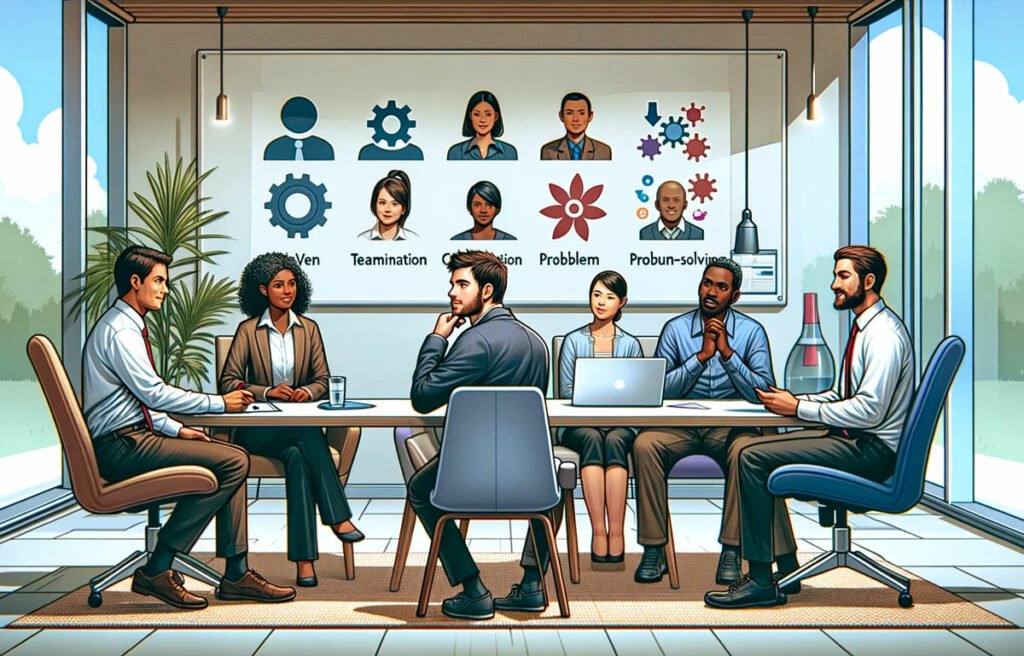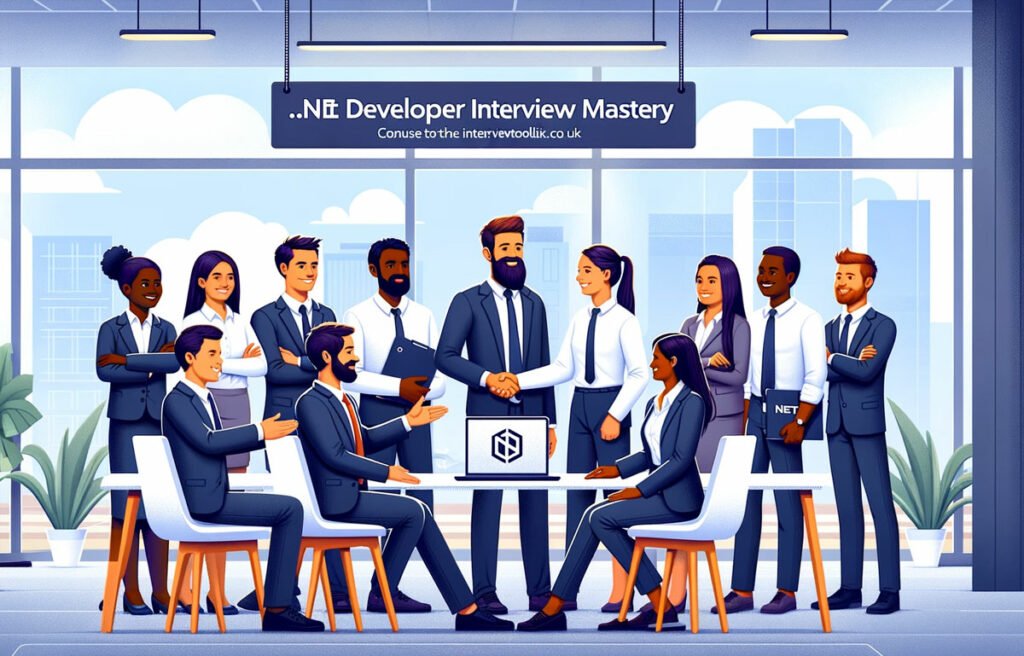Introduction to this Mastery Guide

.NET development is an ever-evolving field in the world of software engineering, bringing forth unique challenges and opportunities for both developers and recruiters. The role of a .NET developer is multifaceted, requiring not only a deep understanding of technical concepts but also the ability to adapt to rapidly changing technologies. As a former .NET developer and a current recruitment specialist, I’ve witnessed firsthand the transformation of the .NET landscape and the corresponding evolution in interview processes.
The interview stage is crucial in identifying the right talent – it’s where technical skills are assessed, cultural fit is evaluated, and potential for growth is determined. However, navigating through the .NET interview process can be daunting for both candidates and interviewers. It demands a careful balance of technical know-how, interpersonal skills, and insight into the .NET framework’s practical applications.
This guide aims to demystify the .NET developer interview process. Whether you are a recruiter seeking to understand the nuances of .NET development or a candidate preparing to showcase your skills, this guide is designed to provide comprehensive insights and practical tips to excel in .NET developer interviews.
As we delve into the world of .NET interviews, we’ll cover a range of topics from understanding the basics of .NET development to tackling complex technical questions. Our journey will encompass various aspects of the .NET framework, exploring how to effectively evaluate technical skills, and understanding what makes a .NET developer stand out in today’s competitive landscape.
In the next section, “Understanding .NET Development,” we will explore the foundations of .NET development, its significance in the tech world, and the essential skills and knowledge a proficient .NET developer should possess. This foundational understanding will set the stage for deeper dives into specific interview questions, techniques, and strategies in subsequent sections.
Let’s embark on this journey to master the art of interviewing for .NET developer roles.
Contents
- Understanding .NET Development
- Essential Interview Questions for .NET Developers
- Technical Deep Dive into .NET Development
- Behavioral and Situational Questions in .NET Developer Interviews
- Interview Strategies for Recruiters: Mastering .NET Developer Interviews
- Preparing for a .NET Interview (Candidate’s Perspective)
- Wrapping Up
Common Questions
- Can you explain the .NET framework and its key components?
- What distinguishes .NET Core from .NET Framework?
- How do you manage memory in a .NET application?
- What are the main features of C# that you find most useful?
- Can you explain LINQ and its advantages?
- Describe the lifecycle of an ASP.NET page.
- How do you secure an ASP.NET web application?
- How do you optimize database access in a .NET application?
Understanding .NET Development

Microsoft’s .NET Framework is a versatile and powerful framework developed by Microsoft, used for building a wide range of applications from web to mobile to Windows-based applications. Understanding the fundamentals of .NET development is crucial for both developers and those involved in the recruitment process. This knowledge not only aids in better technical interviews but also ensures a more effective alignment of skills with project requirements.
The .NET Framework
.NET is a platform that supports multiple languages, including C#, F#, and Visual Basic. Its comprehensive class library, known as the Framework Class Library (FCL), provides extensive functionalities that can be used across various types of applications.
- Common Language Runtime (CLR): The heart of the .NET Framework, CLR, handles the execution of .NET programs, providing services such as memory management, security, and exception handling.
- Base Class Library (BCL): A set of class libraries providing functionalities like file handling, database interaction, XML document manipulation, and more.
.NET Core and .NET 5+
With the introduction of .NET Core and the evolution to .NET 5 and beyond, .NET has become more open-source and cross-platform. This shift enhances the flexibility and scalability of applications.
- Cross-Platform Support: .NET Core extends the .NET development platform to Linux and macOS, making .NET applications more versatile.
- Microservices and Containers: .NET Core is optimized for microservices architectures, and its compatibility with containers like Docker simplifies deployment and testing.
ASP.NET for Web Development
ASP.NET, a key component of the .NET framework, is used for building web applications. With its MVC architecture, it promotes separation of concerns, making applications more manageable and scalable.
- Web Forms and MVC: ASP.NET offers Web Forms for rapid development and MVC for a more controlled and clean architecture.
- Web API & SignalR: For building RESTful services and real-time web functionalities, ASP.NET provides Web API and SignalR frameworks.
Entity Framework for Data Access
Entity Framework is an Object-Relational Mapping (ORM) framework, simplifying data access in applications by allowing developers to work with data in the form of objects.
- Code-First Approach: Developers can define database models using C# classes, with the database schema generated from the models.
- LINQ Queries: LINQ (Language Integrated Query) allows writing queries in C# to manipulate data, making data operations more intuitive.
The .NET Ecosystem
The .NET ecosystem is vast, with various tools, libraries, and community contributions. Understanding this ecosystem is vital for developers to stay updated and for recruiters to recognize key skills.
- NuGet Packages: The NuGet package manager provides access to thousands of third-party libraries, extending the capabilities of .NET applications.
- Visual Studio and VS Code: Robust IDEs that offer powerful tools for .NET development, debugging, and testing.
Understanding .NET development is not just about knowing the technicalities; it’s about appreciating the potential and versatility of the framework. For recruiters, this understanding enables a more insightful evaluation of candidates. For developers, it’s the foundation upon which they can build innovative applications.
In the next section, “Essential Interview Questions for .NET Developers,” we will dive into specific questions that help uncover a candidate’s expertise in .NET, ensuring a comprehensive assessment of their technical capabilities.
Essential Interview Questions for .NET Developers

Interviewing for a .NET developer role requires a comprehensive approach, balancing technical acumen with an understanding of how a candidate’s skills align with your project’s needs. As someone who has straddled both sides of the interview table, I appreciate the importance of asking the right questions to uncover a candidate’s true potential. This section covers a curated list of essential interview questions designed to evaluate a candidate’s technical skills, problem-solving abilities, and overall fit for a .NET developer role.
If you are interviewing for a position as a Junior .NET Developer, make sure you read our Junior .NET Developer Interview questions.
If you are a senior dev, make sure you read our blog post for interviewing for a Senior .NET Developer role.
General .NET Questions
Question 1: Can you explain the .NET framework and its key components?
Why is this question asked? To assess the candidate’s understanding of the .NET framework’s architecture and its core components like CLR, BCL, and FCL.
Quick Answer: The .NET framework is a software development platform developed by Microsoft, primarily used for building and running applications on Windows. It provides a comprehensive and consistent programming model for building applications that have visually stunning user experiences and seamless and secure communication. Key components of the .NET framework include the Common Language Runtime (CLR), which is the execution engine handling running applications, and the .NET Framework Class Library, which provides a library of tested, reusable code that developers can call from their own applications. It supports multiple programming languages, such as C#, VB.NET, and F#, through a common set of base class libraries. The framework also includes ASP.NET for web applications, ADO.NET for data access, and Windows Communication Foundation (WCF) for service-oriented applications. Its interoperability, robust base class libraries, memory management, and security features make it a versatile choice for a wide range of desktop, web, and mobile applications.
Read a more detailed answer to this question here
Question 2: What distinguishes .NET Core from .NET Framework?
Why is this question asked? To gauge the candidate’s awareness of the evolution of .NET and their familiarity with current technologies.
Quick Answer: .NET Core and .NET Framework are both part of the .NET ecosystem, but they have distinct characteristics that set them apart. The primary difference lies in their cross-platform capabilities and architectural design. .NET Core is an open-source, cross-platform framework that can run on Windows, Linux, and macOS, making it ideal for developing modern, cloud-based applications, including web apps, IoT apps, and mobile backends. It’s designed to be modular and lightweight, providing high performance and scalability. On the other hand, the .NET Framework is a Windows-only framework that has been the standard for building Windows desktop applications and web services. It offers a vast range of services and features, including WPF and Windows Forms for desktop applications, and ASP.NET for web applications. However, it lacks the flexibility of .NET Core in terms of cross-platform development and microservices architecture. Thus, while .NET Framework is more established with a comprehensive feature set for Windows-based applications, .NET Core offers more versatility and efficiency for modern, cross-platform applications.
Read a more detailed answer to this question here
Question 3: How do you manage memory in a .NET application?
Why is this question asked? To evaluate the candidate’s knowledge of memory management, garbage collection, and resource handling.
Quick Answer: In managing memory in a .NET application, I primarily rely on the .NET framework’s garbage collector (GC) which automates much of the memory management process. The GC efficiently allocates objects on the managed heap and reclaims objects that are no longer in use, freeing up memory. To optimize this process, I follow best practices such as disposing of unmanaged resources explicitly using the IDisposable interface, understanding and utilizing the ‘using’ statement for objects that implement IDisposable, and being mindful of large object heap (LOH) allocations. Additionally, I pay attention to memory leaks by monitoring for objects that are unintentionally held alive. Profiling tools are also essential in identifying memory usage patterns and potential issues. By combining the strengths of the GC with careful coding practices and regular monitoring, I ensure efficient memory management in my .NET applications.
Read a more detailed answer to this question here
Language-Specific Questions
Question 4: What are the main features of C# that you find most useful?
Why is this question asked? To understand the candidate’s proficiency in C#, including their knowledge of its unique features and how they leverage them in development.
Quick Answer: As a seasoned .NET developer, I find several features of C# particularly beneficial for robust and efficient software development. Firstly, its strong typing system significantly reduces runtime errors and improves code quality. The LINQ (Language Integrated Query) feature is a game-changer, allowing for more readable and concise code when dealing with data. The async/await feature for asynchronous programming is invaluable for developing scalable applications, especially in an era where responsiveness and performance are crucial. Additionally, C#’s interoperability with other languages and platforms, thanks to the .NET framework, enhances its versatility. Finally, the continuous evolution of the language, with regular updates and new features, ensures that C# remains modern and relevant, addressing the latest trends and needs in software development.
Read a more detailed answer to this question here
Question 5: Can you explain LINQ and its advantages?
Why is this question asked? Test the candidate’s experience with Language Integrated Query (LINQ) and their ability to manipulate data efficiently.
Quick Answer: LINQ, which stands for Language Integrated Query, is a powerful feature in .NET that provides a consistent, readable, and concise way to query and manipulate data. It allows developers to write queries for collections, databases, XML, and more in a way that’s integrated with the C# or VB.NET languages. One of the key advantages of LINQ is its ability to provide strong type checking at compile-time, reducing runtime errors. It also simplifies the code by eliminating the need for complex loops and conditional logic to filter or sort data. LINQ queries are also more readable and maintainable, as they closely resemble standard SQL syntax. Moreover, LINQ supports deferred execution, meaning it only retrieves data when it’s actually needed, which can lead to performance improvements. Overall, LINQ enhances productivity, code clarity, and maintainability in .NET applications.
Read a more detailed answer to this question here
ASP.NET Questions
Question 6: Describe the lifecycle of an ASP.NET page.
Why is this question asked? Examine the candidate’s understanding of ASP.NET page processing, event handling, and state management.
Quick Answer: The lifecycle of an ASP.NET page begins with the page request sent by the user to the server. This triggers the start of the lifecycle, where ASP.NET determines whether the request is for a new page or a postback (a subsequent request for the same page). The key stages include initialization, where the page and its controls are initialized; load, where the page is loaded into the server memory; postback event handling, where if the request is a postback, control events like button clicks are handled; rendering, where the page calls the Render method for each control, generating the HTML to be sent to the browser; and finally, the unload stage, where the page is unloaded from the memory. Throughout these stages, various events like PreInit, Init, PreLoad, Load, Control Events, LoadComplete, PreRender, SaveStateComplete, and Render are raised, allowing developers to write custom logic at specific points in the page’s lifecycle. This lifecycle is essential for understanding how to effectively manage state, handle events, and dynamically create controls in ASP.NET web applications.
Read a more detailed answer to this question here
Question 7: How do you secure an ASP.NET web application?
Why is this question asked? Probe into the candidate’s knowledge of web security practices, authentication, and authorization in ASP.NET.
Quick Answer: Securing an ASP.NET web application involves multiple layers of defense to protect against various types of threats. Firstly, it’s crucial to use ASP.NET’s built-in security features like identity and role management for authentication and authorization, ensuring that only authenticated users can access certain parts of the application. Implementing HTTPS with SSL/TLS encryption is essential for securing data in transit. Input validation using model binding and anti-forgery tokens helps prevent SQL injection and cross-site request forgery (CSRF) attacks. Regularly updating the .NET framework and dependencies is vital to patch security vulnerabilities. Additionally, employing secure coding practices, like avoiding storing sensitive data in plain text and using secure APIs, helps mitigate risks. For data protection, implementing encryption for sensitive data both in transit and at rest is crucial. Finally, conducting regular security audits and penetration testing helps identify and rectify potential security weaknesses in the application.
Read a more detailed answer to this question here
Database and Entity Framework Questions
Question 8: How do you optimize database access in a .NET application?
Delve into the candidate’s experience with data access, optimization techniques, and their use of Entity Framework.
Why is this question is asked? This question might be asked during a .NET developer interview to assess the candidate’s understanding of database optimization strategies and their ability to improve the performance of a .NET application by efficiently accessing the database.
Quick Answer: To optimize database access in a .NET application, there are several techniques you can employ. Firstly, you can minimize the number of database round trips by using techniques like batching, caching, and pagination. Additionally, you can optimize query performance by using proper indexing, leveraging stored procedures, and utilizing query optimization tools.
Read a more detailed answer to this question here
- Explain the Code-First approach in Entity Framework.
- Assess the candidate’s familiarity with ORM concepts, particularly Entity Framework and its approaches to database design.
Problem-Solving and Scenario-Based Questions
- How would you troubleshoot a performance issue in a .NET application?
- Test the candidate’s problem-solving skills and their approach to diagnosing and resolving performance issues.
- Describe a challenging project you worked on. What .NET technologies did you use and why?
- Gain insights into the candidate’s practical experience, decision-making process, and the ability to apply .NET technologies effectively.
These questions are designed to provide a comprehensive view of a candidate’s technical skills, their approach to software development, and their ability to solve real-world problems. By tailoring these questions to your specific needs and listening attentively to the answers, you can identify candidates who not only have the right technical skills but also fit well within your team’s culture.
In the next section, “Technical Deep Dive,” we will explore more advanced topics and delve deeper into the technical aspects of .NET development, ensuring you are well-equipped to assess candidates at a higher level of expertise.
Technical Deep Dive into .NET Development

The world of .NET development is rich and complex, offering a myriad of functionalities and frameworks to master. A technical deep dive into .NET requires exploring advanced concepts, understanding best practices, and keeping abreast of the latest developments. This section is aimed at providing an in-depth understanding of critical technical aspects of .NET, which are essential for both experienced developers and technical recruiters.
Advanced .NET Framework Concepts
- Garbage Collection and Memory Management: Understanding how the .NET framework handles memory allocation and garbage collection is crucial for writing efficient, leak-free code.
- Thread Management and Asynchronous Programming: Mastery of threading and async programming in .NET improves application performance and responsiveness.
C# Advanced Features
- Delegates, Events, and Lambdas: These are fundamental to writing clean and maintainable C# code, enabling more functional-style programming and event-driven architectures.
- Reflection and Attributes: Reflection provides a way to inspect assemblies, types, and members at runtime, while attributes offer a means to add metadata to your code.
.NET Core and Modern .NET
- Microservices Architecture: How .NET Core facilitates the development of scalable, independent microservices.
- Cross-Platform Development: Building applications that run seamlessly on Windows, Linux, and macOS using .NET Core.
ASP.NET Core and Web Development
- Middleware and Request Pipeline: Understanding how requests are processed in ASP.NET Core and how to customize the pipeline with middleware.
- Identity and Security: Implementing authentication and authorization, ensuring secure data handling in web applications.
Entity Framework Core
- Performance Optimization: Techniques for enhancing performance, like lazy loading, eager loading, and query optimization.
- Migrations and Database Schema Management: Managing database changes and schema evolution in a controlled and consistent manner.
Performance Tuning and Best Practices
- Code Profiling and Optimization: Techniques for identifying performance bottlenecks and optimizing .NET code.
- Best Practices in Exception Handling: How to effectively handle exceptions and create resilient .NET applications.
Staying Current with .NET
- Latest Updates and Features: Keeping up-to-date with the latest developments in .NET, including new releases and features.
- Community and Resources: Leveraging the .NET community, forums, and documentation for continuous learning and problem-solving.
A technical deep dive into .NET reveals the sophistication and capabilities of the framework. For recruiters, this knowledge is invaluable in assessing the technical depth of candidates. For developers, it provides a roadmap for advancing their skills and staying relevant in a dynamic tech landscape.
In the next section, “Behavioral and Situational Questions,” we will explore how to assess candidates beyond technical skills, focusing on their problem-solving abilities, teamwork, and adaptability.
Behavioral and Situational Questions in .NET Developer Interviews

In the process of interviewing .NET developers, while technical skills are paramount, understanding a candidate’s behavioral traits and situational responses is equally crucial. This section focuses on the types of behavioral and situational questions that can provide deeper insights into a candidate’s personality, work style, and problem-solving approach. These questions are designed to reveal how a candidate functions in real-world scenarios and within a team, which is vital for predicting their success in your organization.
Behavioral Questions
Behavioral questions are aimed at understanding a candidate’s past experiences and actions in various work-related situations. They offer a glimpse into the candidate’s personality, work ethic, and interpersonal skills.
- Can you describe a challenging project you worked on and how you handled it?
- This question seeks to understand the candidate’s problem-solving skills, resilience, and ability to work under pressure.
- How do you approach conflicts within a team? Provide an example.
- Aimed at evaluating the candidate’s conflict resolution skills and their ability to work collaboratively.
- Tell us about a time you had to learn a new technology or framework quickly.
- Assesses adaptability, learning ability, and how the candidate approaches new challenges.
Situational Questions
Situational questions delve into how a candidate might react or decide in hypothetical scenarios. They are useful for assessing problem-solving, decision-making, and critical thinking skills.
- If you were given a project with a tight deadline and limited resources, how would you manage?
- Tests the candidate’s project management skills and ability to prioritize under pressure.
- Imagine a situation where your technical approach differs from a senior team member’s. How would you handle it?
- Evaluates communication skills, respect for hierarchy, and collaborative problem-solving.
- How would you deal with a situation where you find a critical bug in a project nearing its deadline?
- Checks the candidate’s ability to handle stress, their problem-solving approach, and commitment to quality.
The responses to these questions can provide valuable insights into a candidate’s personality, work style, and suitability for your team. They complement the technical assessment by painting a fuller picture of the candidate as a potential team member.
Understanding how to interpret answers to these questions is key. Look for concrete examples, consistency in responses, and alignment with your organization’s values and work culture. Remember, the goal is not just to find a technically proficient candidate but one who will thrive and contribute positively to your team’s dynamics.
In the next section, “Interview Strategies for Recruiters,” we will focus on guiding recruiters on how to conduct effective and insightful .NET developer interviews, combining technical and behavioral assessments.
Interview Strategies for Recruiters: Mastering .NET Developer Interviews

Recruiting .NET developers requires a combination of technical insight, strategic questioning, and the ability to assess cultural fit. As recruiters, it’s essential to be well-prepared and tactful in conducting interviews that effectively gauge a candidate’s abilities and potential. This section is designed to provide recruiters with strategies and tips for conducting successful .NET developer interviews.
Understanding .NET Technicalities
- Familiarize with Basic Concepts: Even if you’re not a developer, understanding the basics of .NET, C#, and ASP.NET can greatly help in assessing candidates.
- Review Technical Requirements: Know the specific technical skills and frameworks relevant to the role you are hiring for.
Structuring the Interview
- Prepare a Mix of Questions: Combine technical, behavioral, and situational questions to get a holistic view of the candidate.
- Use a Standardized Rating System: This helps in objectively evaluating candidates and comparing their performances.
Conducting the Interview
- Set a Welcoming Tone: Start with a brief introduction and a comfortable setting to put the candidate at ease.
- Ask Open-Ended Questions: Encourage candidates to elaborate on their experiences and thought processes.
- Listen Actively: Pay attention to the candidate’s responses, noting both their technical competence and communication skills.
Evaluating Technical Skills
- Practical Assessments: Include coding challenges or problem-solving exercises relevant to the job role.
- Discuss Past Projects: Ask candidates to describe their previous work, focusing on their contributions and the technologies used.
Assessing Cultural Fit
- Understand Your Company Culture: Know what personality traits and values are a good fit for your team.
- Behavioral Questions: Use these to gauge how the candidate might fit within the team and handle workplace scenarios.
Closing the Interview
- Provide an Overview of the Role: Clearly explain the job responsibilities and expectations.
- Encourage Questions: Allow the candidate to ask questions, as this can also reveal their level of interest and understanding of the role.
Post-Interview Evaluation
- Collaborate with Technical Assessors: If you’re not technical, discuss the candidate’s technical responses with knowledgeable team members.
- Holistic Candidate Review: Consider all aspects of the candidate’s performance and potential fit within the team.
Effective interviewing is a skill that combines thorough preparation, keen observation, and good communication. By employing these strategies, recruiters can not only identify technically proficient candidates but also those who will thrive and contribute positively to the team’s dynamics.
In the next section, “Preparing for a .NET Interview (Candidate’s Perspective),” we will switch gears and offer guidance for candidates preparing for .NET developer interviews.
Preparing for a .NET Interview (Candidate’s Perspective)

As a candidate gearing up for a .NET developer interview, thorough preparation is key to demonstrating your skills and suitability for the role. This section offers guidance on how to effectively prepare for a .NET interview, covering technical preparation, understanding the role, and developing soft skills.
Technical Preparation
- Review Core Concepts: Brush up on fundamental .NET concepts, C#, ASP.NET, and Entity Framework. Ensure you understand the basics thoroughly.
- Practice Coding: Work on coding exercises, especially those that involve common .NET interview problems.
- Understand Advanced Topics: Familiarize yourself with advanced topics such as memory management, asynchronous programming, and .NET Core.
- Explore the Latest Trends: Stay updated with the latest in .NET, such as new features in the latest versions or emerging best practices.
Role-Specific Preparation
- Job Description Review: Understand the specific requirements and technologies mentioned in the job description.
- Real-World Application: Be prepared to discuss how you’ve applied .NET technologies in real-world scenarios.
- Project Highlights: Be ready to talk in detail about your significant projects, your role, and the technologies used.
Soft Skills and Behavioral Preparation
- Communication Skills: Practice explaining complex technical concepts in simple terms.
- Problem-Solving Scenarios: Prepare to discuss past experiences where you solved difficult problems or overcame challenges.
- Teamwork and Adaptability: Reflect on experiences that demonstrate your ability to work in a team and adapt to changing environments.
Mock Interviews
- Practice with Peers or Mentors: Conduct mock interviews to get comfortable with the format and receive feedback.
- Time Management: Practice answering questions succinctly and effectively within a limited time frame.
Day Before the Interview
- Rest and Relaxation: Ensure you’re well-rested and clear-headed for the interview day.
- Final Review: Go over your notes and key points, but avoid last-minute cramming.
Interview Day
- Dress Appropriately: Choose professional attire that fits the company culture.
- Be Punctual: Arrive early to avoid any last-minute rush.
- Carry Necessary Documents: Have copies of your resume, portfolio, and any other relevant documents.
Preparation is crucial, but so is confidence in your abilities. Remember, the interview is also an opportunity for you to assess if the role is a good fit for you. Be clear about what you can offer and what you expect from the role.
Wrapping Up: Insights and Pathways in .NET Developer Interviews

As we conclude this comprehensive guide on .NET Developer interviews, it’s important to reflect on the key insights and pathways that have been highlighted. This journey through various aspects of .NET interviews has provided a roadmap for both recruiters and candidates to navigate the complexities of the hiring process in the tech industry.
Key Takeaways
- For Recruiters: Understanding the technicalities of .NET development, coupled with strategic interviewing techniques, is crucial for identifying the right talent. Balancing technical assessments with behavioral and situational questions provides a well-rounded view of a candidate’s capabilities.
- For Candidates: Preparation is the cornerstone of success. Familiarity with .NET concepts, practical coding experience, and soft skills development are essential. Remember, interviews are as much about showcasing your skills as they are about ensuring the role aligns with your career aspirations.
Future Trends and Continuous Learning
- Staying Updated: The tech industry, especially areas like .NET development, is continually evolving. Both recruiters and candidates should stay informed about the latest trends, frameworks, and best practices.
- Continuous Learning: For developers, continuous skill enhancement and adapting to new technologies are key. For recruiters, understanding emerging technologies and their impact on hiring is crucial.
Building Connections
- Networking and Community Engagement: Engaging with the .NET community, attending meetups, and participating in forums can provide valuable insights and connections.
- Feedback and Improvement: Always seek feedback from interview experiences and use it for continuous improvement.
InterviewToolkit.co.uk: Your Partner in Recruitment
- Comprehensive Resources: InterviewToolkit.co.uk aims to be your go-to resource for recruitment insights, offering in-depth guides, latest industry news, and practical tips.
- Tailored Assistance: Whether you’re a recruiter seeking to improve your hiring process or a candidate preparing for your next interview, our platform is designed to support your journey.
Final Thoughts
The journey through the .NET Developer Interview Mastery Guide is not just about succeeding in interviews; it’s about understanding the intricacies of .NET development, the art of effective communication, and the importance of finding the right fit. Whether you are on the hiring side or the candidate side, this guide serves as a comprehensive resource to help you navigate the path ahead with confidence and expertise.
Thank you for joining us on this journey, and we wish you success in your future .NET developer interviews.
